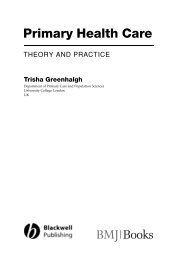- Page 2 and 3: Christianity A SHORT GLOBAL HISTORY
- Page 4 and 5: Christianity A SHORT GLOBAL HISTORY
- Page 6: For the teams that didn’t play: D
- Page 9 and 10: 5 CONQUEST, REFORMATION AND INDIGEN
- Page 11 and 12: 2 ◆ Christianity A SHORT GLOBAL H
- Page 13 and 14: 4 ◆ Christianity A SHORT GLOBAL H
- Page 15 and 16: 6 ◆ Christianity A SHORT GLOBAL H
- Page 17 and 18: 8 ◆ Christianity A SHORT GLOBAL H
- Page 19: 10 ◆ Christianity A SHORT GLOBAL
- Page 23 and 24: 14 ◆ Christianity A SHORT GLOBAL
- Page 25 and 26: 16 ◆ Christianity A SHORT GLOBAL
- Page 27 and 28: 18 ◆ Christianity A SHORT GLOBAL
- Page 29 and 30: 20 ◆ Christianity A SHORT GLOBAL
- Page 31 and 32: 22 ◆ Christianity A SHORT GLOBAL
- Page 33 and 34: 24 ◆ Christianity A SHORT GLOBAL
- Page 35 and 36: 26 ◆ Christianity A SHORT GLOBAL
- Page 37 and 38: 28 ◆ Christianity A SHORT GLOBAL
- Page 39 and 40: 30 ◆ Christianity A SHORT GLOBAL
- Page 41 and 42: 32 ◆ Christianity A SHORT GLOBAL
- Page 43 and 44: 34 ◆ Christianity A SHORT GLOBAL
- Page 45 and 46: 36 ◆ Christianity A SHORT GLOBAL
- Page 47 and 48: 38 ◆ Christianity A SHORT GLOBAL
- Page 49 and 50: 40 ◆ Christianity A SHORT GLOBAL
- Page 51 and 52: 42 ◆ Christianity A SHORT GLOBAL
- Page 53 and 54: 44 ◆ Christianity A SHORT GLOBAL
- Page 55 and 56: 46 ◆ Christianity A SHORT GLOBAL
- Page 57 and 58: 48 ◆ Christianity A SHORT GLOBAL
- Page 59 and 60: 50 ◆ Christianity A SHORT GLOBAL
- Page 61 and 62: 52 ◆ Christianity A SHORT GLOBAL
- Page 63 and 64: 54 ◆ Christianity A SHORT GLOBAL
- Page 65 and 66: 56 ◆ Christianity A SHORT GLOBAL
- Page 67 and 68: 58 ◆ Christianity A SHORT GLOBAL
- Page 69 and 70: 60 ◆ Christianity A SHORT GLOBAL
- Page 71 and 72:
62 ◆ Christianity A SHORT GLOBAL
- Page 73 and 74:
64 ◆ Christianity A SHORT GLOBAL
- Page 75 and 76:
66 ◆ Christianity A SHORT GLOBAL
- Page 77 and 78:
68 ◆ Christianity A SHORT GLOBAL
- Page 79 and 80:
70 ◆ Christianity A SHORT GLOBAL
- Page 81 and 82:
72 ◆ Christianity A SHORT GLOBAL
- Page 83 and 84:
74 ◆ Christianity A SHORT GLOBAL
- Page 85 and 86:
76 ◆ Christianity A SHORT GLOBAL
- Page 87 and 88:
78 ◆ Christianity A SHORT GLOBAL
- Page 89 and 90:
80 ◆ Christianity A SHORT GLOBAL
- Page 91 and 92:
82 ◆ Christianity A SHORT GLOBAL
- Page 93 and 94:
84 ◆ Christianity A SHORT GLOBAL
- Page 95 and 96:
86 ◆ Christianity A SHORT GLOBAL
- Page 97 and 98:
88 ◆ Christianity A SHORT GLOBAL
- Page 99 and 100:
90 ◆ Christianity A SHORT GLOBAL
- Page 101 and 102:
92 ◆ Christianity A SHORT GLOBAL
- Page 103 and 104:
94 ◆ Christianity A SHORT GLOBAL
- Page 105 and 106:
96 ◆ Christianity A SHORT GLOBAL
- Page 107 and 108:
98 ◆ Christianity A SHORT GLOBAL
- Page 109 and 110:
100 ◆ Christianity A SHORT GLOBAL
- Page 111 and 112:
102 ◆ Christianity A SHORT GLOBAL
- Page 113 and 114:
104 ◆ Christianity A SHORT GLOBAL
- Page 115 and 116:
106 ◆ Christianity A SHORT GLOBAL
- Page 117 and 118:
4 CRUSADES TO THE NEAR EXTINCTION O
- Page 119 and 120:
110 ◆ Christianity A SHORT GLOBAL
- Page 121 and 122:
112 ◆ Christianity A SHORT GLOBAL
- Page 123 and 124:
114 ◆ Christianity A SHORT GLOBAL
- Page 125 and 126:
116 ◆ Christianity A SHORT GLOBAL
- Page 127 and 128:
118 ◆ Christianity A SHORT GLOBAL
- Page 129 and 130:
120 ◆ Christianity A SHORT GLOBAL
- Page 131 and 132:
122 ◆ Christianity A SHORT GLOBAL
- Page 133 and 134:
124 ◆ Christianity A SHORT GLOBAL
- Page 135 and 136:
126 ◆ Christianity A SHORT GLOBAL
- Page 137 and 138:
128 ◆ Christianity A SHORT GLOBAL
- Page 139 and 140:
130 ◆ Christianity A SHORT GLOBAL
- Page 141 and 142:
132 ◆ Christianity A SHORT GLOBAL
- Page 143 and 144:
134 ◆ Christianity A SHORT GLOBAL
- Page 145 and 146:
136 ◆ Christianity A SHORT GLOBAL
- Page 147 and 148:
138 ◆ Christianity A SHORT GLOBAL
- Page 149 and 150:
140 ◆ Christianity A SHORT GLOBAL
- Page 151 and 152:
142 ◆ Christianity A SHORT GLOBAL
- Page 153 and 154:
144 ◆ Christianity A SHORT GLOBAL
- Page 155 and 156:
146 ◆ Christianity A SHORT GLOBAL
- Page 157 and 158:
148 ◆ Christianity A SHORT GLOBAL
- Page 159 and 160:
150 ◆ Christianity A SHORT GLOBAL
- Page 161 and 162:
152 ◆ Christianity A SHORT GLOBAL
- Page 163 and 164:
154 ◆ Christianity A SHORT GLOBAL
- Page 165 and 166:
156 ◆ Christianity A SHORT GLOBAL
- Page 167 and 168:
158 ◆ Christianity A SHORT GLOBAL
- Page 169 and 170:
160 ◆ Christianity A SHORT GLOBAL
- Page 171 and 172:
162 ◆ Christianity A SHORT GLOBAL
- Page 173 and 174:
164 ◆ Christianity A SHORT GLOBAL
- Page 175 and 176:
166 ◆ Christianity A SHORT GLOBAL
- Page 177 and 178:
168 ◆ Christianity A SHORT GLOBAL
- Page 179 and 180:
170 ◆ Christianity A SHORT GLOBAL
- Page 181 and 182:
172 ◆ Christianity A SHORT GLOBAL
- Page 183 and 184:
174 ◆ Christianity A SHORT GLOBAL
- Page 185 and 186:
176 ◆ Christianity A SHORT GLOBAL
- Page 187 and 188:
178 ◆ Christianity A SHORT GLOBAL
- Page 189 and 190:
180 ◆ Christianity A SHORT GLOBAL
- Page 191 and 192:
182 ◆ Christianity A SHORT GLOBAL
- Page 193 and 194:
184 ◆ Christianity A SHORT GLOBAL
- Page 195 and 196:
186 ◆ Christianity A SHORT GLOBAL
- Page 197 and 198:
188 ◆ Christianity A SHORT GLOBAL
- Page 199 and 200:
190 ◆ Christianity A SHORT GLOBAL
- Page 201 and 202:
192 ◆ Christianity A SHORT GLOBAL
- Page 203 and 204:
194 ◆ Christianity A SHORT GLOBAL
- Page 205 and 206:
196 ◆ Christianity A SHORT GLOBAL
- Page 207 and 208:
198 ◆ Christianity A SHORT GLOBAL
- Page 209 and 210:
200 ◆ Christianity A SHORT GLOBAL
- Page 211 and 212:
202 ◆ Christianity A SHORT GLOBAL
- Page 213 and 214:
204 ◆ Christianity A SHORT GLOBAL
- Page 215 and 216:
7 WESTERN MISSIONARY EXPANSION, 180
- Page 217 and 218:
208 ◆ Christianity A SHORT GLOBAL
- Page 219 and 220:
210 ◆ Christianity A SHORT GLOBAL
- Page 221 and 222:
212 ◆ Christianity A SHORT GLOBAL
- Page 223 and 224:
214 ◆ Christianity A SHORT GLOBAL
- Page 225 and 226:
216 ◆ Christianity A SHORT GLOBAL
- Page 227 and 228:
218 ◆ Christianity A SHORT GLOBAL
- Page 229 and 230:
220 ◆ Christianity A SHORT GLOBAL
- Page 231 and 232:
222 ◆ Christianity A SHORT GLOBAL
- Page 233 and 234:
224 ◆ Christianity A SHORT GLOBAL
- Page 235 and 236:
226 ◆ Christianity A SHORT GLOBAL
- Page 237 and 238:
228 ◆ Christianity A SHORT GLOBAL
- Page 239 and 240:
230 ◆ Christianity A SHORT GLOBAL
- Page 241 and 242:
232 ◆ Christianity A SHORT GLOBAL
- Page 243 and 244:
234 ◆ Christianity A SHORT GLOBAL
- Page 245 and 246:
236 ◆ Christianity A SHORT GLOBAL
- Page 247 and 248:
8 POST-CHRISTENDOM WEST, NON-WESTER
- Page 249 and 250:
240 ◆ Christianity A SHORT GLOBAL
- Page 251 and 252:
242 ◆ Christianity A SHORT GLOBAL
- Page 253 and 254:
244 ◆ Christianity A SHORT GLOBAL
- Page 255 and 256:
246 ◆ Christianity A SHORT GLOBAL
- Page 257 and 258:
248 ◆ Christianity A SHORT GLOBAL
- Page 259 and 260:
250 ◆ Christianity A SHORT GLOBAL
- Page 261 and 262:
252 ◆ Christianity A SHORT GLOBAL
- Page 263 and 264:
254 ◆ Christianity A SHORT GLOBAL
- Page 265 and 266:
256 ◆ Christianity A SHORT GLOBAL
- Page 267 and 268:
258 ◆ Christianity A SHORT GLOBAL
- Page 269 and 270:
260 ◆ Christianity A SHORT GLOBAL
- Page 271 and 272:
262 ◆ Christianity A SHORT GLOBAL
- Page 273 and 274:
264 ◆ Christianity A SHORT GLOBAL
- Page 275 and 276:
266 ◆ Christianity A SHORT GLOBAL
- Page 277 and 278:
268 ◆ Christianity A SHORT GLOBAL
- Page 279 and 280:
270 ◆ Christianity A SHORT GLOBAL
- Page 281 and 282:
272 ◆ Christianity A SHORT GLOBAL
- Page 283 and 284:
274 ◆ Christianity A SHORT GLOBAL
- Page 285 and 286:
276 ◆ Christianity A SHORT GLOBAL
- Page 287 and 288:
278 ◆ Christianity A SHORT GLOBAL
- Page 289 and 290:
280 ◆ Christianity A SHORT GLOBAL
- Page 291 and 292:
282 ◆ Christianity A SHORT GLOBAL
- Page 293 and 294:
284 ◆ INDEX Anchieta, José de 14
- Page 295 and 296:
286 ◆ INDEX and Islam 78-79 Mia-P
- Page 297 and 298:
288 ◆ INDEX French revolution 206
- Page 299 and 300:
290 ◆ INDEX in Latin America 190-
- Page 301 and 302:
292 ◆ INDEX Nicene creeds 66 filo
- Page 303 and 304:
294 ◆ INDEX Russian Orthodox Chur
- Page 305:
296 ◆ INDEX virgin birth 9, 44, 7
















